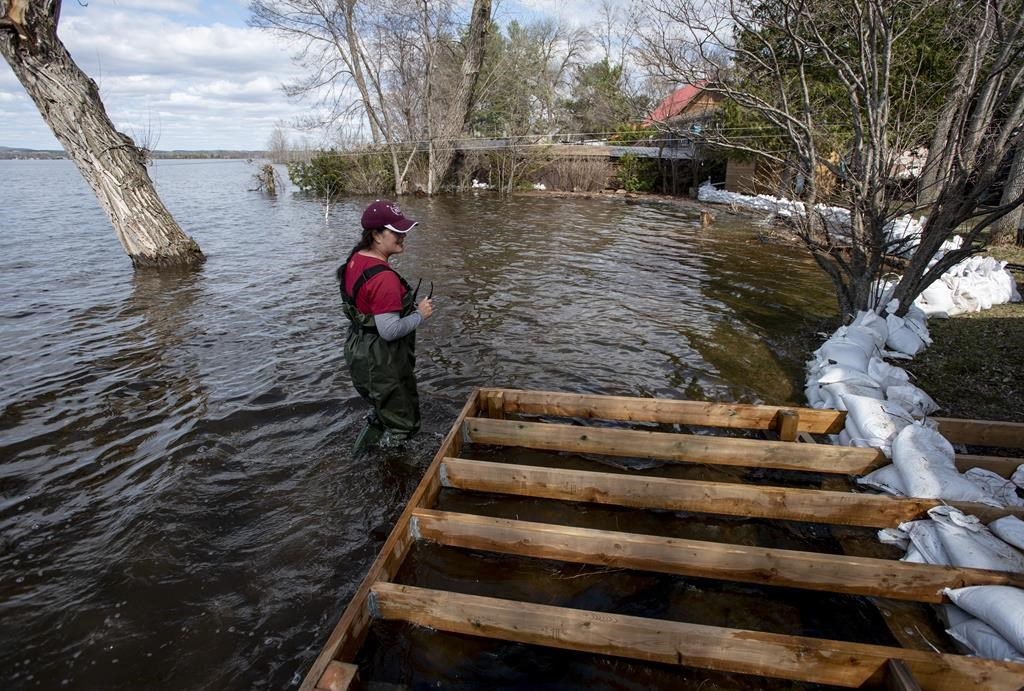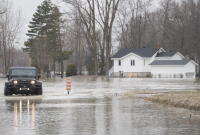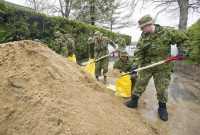Support strong Canadian climate journalism for 2025
Flood-ravaged provinces are asking the federal government to provide almost $138 million to move or buy out homeowners affected by previous years' inundations, according to new data that gives a glimpse into the national costs of helping residents leave floodplains.
Calculations based on previous experience suggest that the total cost of giving up on 100,000 of the most endangered structures could run into the billions.
Only four times in the past decade have provinces turned to the federal treasury for help to move homes — twice in New Brunswick, and once each in Quebec and Yukon.
In New Brunswick's case, the federal government picked up more than 80 per cent of the $1.8 million spent to buy out a combined 36 properties after flooding in 2008 and 2010.
Public Safety Canada says provinces and territories have asked for $137.9 million in federal money to help cover costs related to 10 floods, but the dollar figure is only an estimate and doesn't include this year's.
The department says it expects to get more requests for financial help to relocate homes as the frequency of extreme flooding increases and wants to know how much provinces and territories have spent on it without federal help.
All that data will feed into a debate governments are having about whether it's better to move people off floodplains rather than repeatedly pay for repairs.
Federal help for disaster relief kicks in once costs surpass what lower levels of government could reasonably be expected to cover on their own.
Within the program, called the "Disaster Financial Assistance Arrangements," is a provision that allows provinces to claim the cost of relocating residents to areas less prone to floods or other disasters. Federal funding can also be used to buy out affected homeowners and dismantle damaged buildings.
How much gets doled out depends on the design of the buyout program, which has become a point in discussions between Public Safety Minister Ralph Goodale and his provincial and territorial counterparts.
A program could provide money up to a pre-set maximum, which is what Quebec's government is offering this year — up to $200,000 to anyone with severe damage to their homes. Or it could pay the full estimated value of a home before it was flooded, as Alberta did after flooding there in 2013.
In that case, about one-third of homeowners who were offered buyouts took them within a year of the offer, costing the province $81 million in 2014. Alberta covered the bill itself, without federal assistance.
Based on the data available, the federal government has paid, on average, about $41,000 for each property owner who accepted previous buyouts in New Brunswick.
This year, New Brunswick is offering up to $160,000 for each home where damage exceeds 80 per cent of its pre-flood value. Owners can sell their buildings and have them demolished and levelled but retain their land. They can also sell out entirely, or take up to $160,000 to use on repairs — in exchange for giving up any future disaster aid.
The Insurance Bureau of Canada estimates about 100,000 homes — out of the 14 million dwellings Statistics Canada counted in the 2016 census — are at the highest risk of repeat flood damage. A buyout program for those properties could cost the federal treasury hundreds of millions of dollars based on the limited information available about previous federal disaster help, in addition to what provincial governments put up.
"No government bailout program or insurance program is going to be able to deal with those repeated cases where you're going to have repeated claims in a short period of time. That's where you may focus buyouts," said Craig Stewart, vice-president of federal affairs with the Insurance Bureau of Canada.
"In our view, the calculation is buy out a few and then protect and insure the rest."




Comments